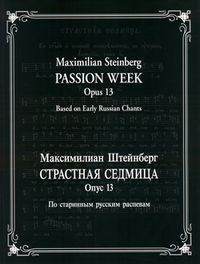"'Passion Week'"... is on a scale with the great sacred works of Tchaikovsky and Rachmaninoff, though in a slightly more advanced idiom, and is quite simple beautiful." -- James R. Oestreich,
The New York Times (May 2015)
Maximilian Steinberg completed his
Passion Week in 1923, just weeks before the Soviets banned all sacred music in Russia. Although the score was published in 1927, the work was essentially lost in oblivion for 90 years, until its world premiere in April 2014 by Portland-based Cappella Romana. The present edition was prepared in connection with that premiere and the subsequent recording (our
catalog number A137). The 45-minute work contains 11 movements, all but one of which are based on early Russian chants--mostly znamenny, but also Kievan and Bulgarian. Steinberg, who was Nikolai Rimsky-Korsakov's student, protege and eventually, son-in-law, undoubtedly also learned about chants and techniques for arranging them polyphonically from his mentor. Stylistically, Steinberg follows in the footsteps of
Gretchaninoff's Passion Week and
Rachmaninoff's All-Night Vigil, but in some respects surpasses both those works. The harmonies are sumptious and opulent, but at the same time, austere and ascetic, befitting both the somber subject of Christ's Passion and the atmosphere of war, anarchy and militant atheism the composer was witnessing around him. After lying silent for so long, this work represents an important addition to the lineup of Russian choral masterworks from the "Silver Age."
 Look Inside
Look Inside
















